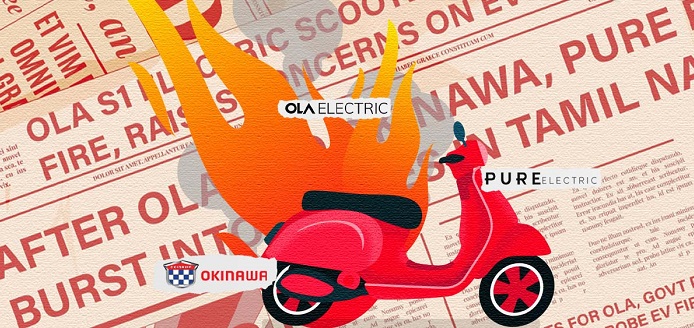It is the perfect storm that the startup world would have wanted to avoid. A clutch of electric scooters made by Ola, Okinawa, Pure EV, and Jitendra EV caught fire over the last fortnight damaging the tech credibility of new-age companies. While its impact on the overall demand for electric two wheelers is likely to be negligible in the medium term, it provides an opportunity for legacy firms like Hero MotoCorp, TVS and Bajaj Auto to profit from it.
“This will definitely work in favour of legacy automakers. They have built credibility over decades that consumers trust,” said Hemal Thakkar, director, CRISIL Ltd. “An automobile needs rigorous testing and validation and traditional companies know the entire process best. They also know how damaging it could be to cut corners or to rush to the market with an unfinished product, so they will never do it. That is reassuring to consumers.”
Experts have pointed out the rush to market as the main reason behind the fires. The high cost of petrol along with subsidies from central and state governments have created a strong demand for electric two-wheelers, which startups have sought to exploit. In the process, however, safety has taken a backseat and the fires are a result of that.
“This will definitely impact the perception of startups. The Indian middle-class consumer also goes for the safest choice and here companies like Hero MotoCorp, TVS or Bajaj score high,” said Avik Chattopadhyay, co-founder, Expereal. “Word of mouth plays a crucial role here.”
“It is not like making an app which can crash and you can fix it through over-the-air updates. This is hardware and even if one component fails, the entire machine stalls,” said an industry veteran who worked in one of the startup companies but left in a huff in six months. “They do not realize that and are all in so much hurry. As if the world is going to end in 2024. Recalls can be very expensive and damaging for the prospects of a new company.”
With a relatively low entry barrier, startups flush with venture capital funds and aided by a readymade supplier base in China, have flooded the Indian two-wheeler segment in the last five years. On paper, the strategy was simple and attractive. With the legacy players non committal and dragging their feet on electrification, they sought to wrest the initiative and shore up attractive valuation of their business when the market gains scale over the course of this decade. The fire incidents have however, put a question mark on their ability to execute while reinforcing the importance of good old manufacturing.
“Safety is a key criteria for customers. Customers are looking for a safe and dependable solution to their mobility needs. The two and three wheeler electric vehicle journey started in the informal sector due to low regulations, low capex needs and sometimes flying under the regulatory radar,” added Ravi Bhatia, President and Director, JATO Dynamics Ltd. “The fire incidents have shaken up the consumer trust and also regulators out of complacency. As the regulations tighten around EVs the cost of compliance will increase as well.”
Yet, it may not be easy for the traditional companies either to exploit any potential backlash against startups. For one, they seem ill prepared and the opening may have come a little too early. The largest two wheeler maker in the country Hero MotoCorp is only now getting ready to launch its first electric scooter in the market while arch rival Honda Motorcycles and Scooters India will only do so in the next fiscal.
“It may be an opportunity for them but I do not really feel they are equipped to exploit it,” said Akshay Singhal, founder and CEO, Log9 Materials. “They do not have the scale nor is it a priority for them yet. These incidents highlight the need for R&D that is suited for Indian conditions and whoever does it best irrespective of whether it’s a startup or not, will win.”
The two legacy firms that are already present in the market–TVS and Bajaj, are not really firing on all cylinders either. Both companies sold less than 10,000 units each of their iQube and Chetak scooters respectively and were not even among the top 5 electric two-wheeler makers in the country.
“If the ground is leveled the companies with more resources may be better prepared. Trust is one of the very important criteria and it is not just a function of legacy but built through sustained actions. I would not write off resourceful new-age companies. They have the zeal, innovation and resources to recover lost ground,” said Bhatia of JATO Dynamics. “Legacy companies on the other hand have baggage. They will have to divide resources to maintain legacy business ( still a large share) and invest in innovation. It is not going to be easy.”
If the fires are a sobering reality check for startups, the strong growth in the last two years suggests legacy companies cannot dither anymore either. In the electric two-wheeler segment, it is now or never.
“This is a growing market, which is continuously evolving and challenges will be there. But at the same time this is also an opportunity for companies to prove their mettle, engineering excellence by overcoming such challenges and providing a world-class product to both Indian customers and even global,” said Vikas Aggarwal, founder, and managing director, iPower Batteries. “It has nothing really to do with benefiting only legacy companies as each company small or big will be better than the other in some way.”








